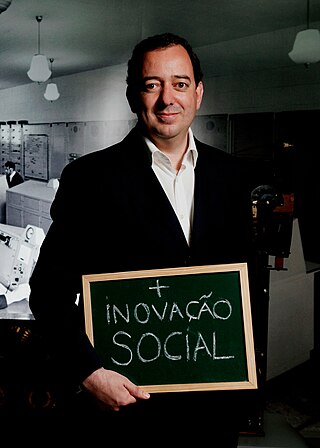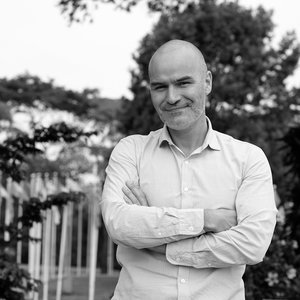
The Tech Interactive is a science and technology center that offers hands-on activities, labs, design challenges and other STEAM education resources. It is located in downtown San Jose, California, adjacent to the Plaza de César Chávez.
XPRIZE Foundation is a non-profit organization that designs and hosts public competitions intended to encourage technological development. The XPRIZE mission is to bring about "radical breakthroughs for the benefit of humanity" through incentivized competition. It aims to motivate individuals, companies, and organizations to develop ideas and technologies.
Technology governance means the governance, i.e., the steering between the different sectors—state, business, and NGOs—of the development of technology. It is the idea of governance within technology and its use, as well as the practices behind them. The concept is based on the notion of innovation and of techno-economic paradigm shifts according to the theories by scholars such as Joseph A. Schumpeter, Christopher Freeman, and Carlota Perez.
An inducement prize contest (IPC) is a competition that awards a cash prize for the accomplishment of a feat, usually of engineering. IPCs are typically designed to extend the limits of human ability. Some of the most famous IPCs include the Longitude prize (1714–1765), the Orteig Prize (1919–1927) and prizes from enterprises such as Challenge Works and the X Prize Foundation.
The ethics of artificial intelligence covers a broad range of topics within the field that are considered to have particular ethical stakes. This includes algorithmic biases, fairness, automated decision-making, accountability, privacy, and regulation. It also covers various emerging or potential future challenges such as machine ethics, lethal autonomous weapon systems, arms race dynamics, AI safety and alignment, technological unemployment, AI-enabled misinformation, how to treat certain AI systems if they have a moral status, artificial superintelligence and existential risks.
Singularity Education Group is an American company that offers executive educational programs, a business incubator, and business consultancy services. Although the company uses the word "university" in its branding, it is not an accredited university and has no academic programs or accreditation.

Diogo Vasconcelos was a Portuguese politician, who focused his work on innovation and on the fundamental role of ICT and next generation broadband for fostering innovation and supporting new decentralized models to address some of the major global societal challenges of the 21st century. Diogo addressed such issues as climate change, urbanization, globalization, ageing population, sustainable prosperity, democracy and citizen’s participation, etc. During his career, he worked with different governments in Europe and the Middle East, with the European Commission, with the UN’s High Commissioner for the Alliance of Civilizations and the European Investment Bank, OECD, among others.

The World Governments Summit is a global, neutral, non-profit organization based in Dubai, United Arab Emirates. It convenes annually, bringing together leaders from government, academia, and the private sector to engage in discussions on futurism, technology innovation, and other pressing issues. Since its inception in 2013, the Summit has served as a premier knowledge exchange hub, fostering conversations on future trends, challenges, and opportunities among government officials, policymakers, thought leaders, and industry experts. Featuring over 790 speakers from 150 countries and attracting more than 4,000 attendees, the Summit is organized by the World Governments Summit Organization, which is dedicated to shaping the future of governance through innovation and collaborative efforts.

District 3 Innovation Hub (D3) is a startup accelerator and entrepreneurial community located within Concordia University in downtown Montréal where students, alumni and academic leaders share ideas and generate new products. It is located in the Faubourg building following a grant of $1 million from André Desmarais and France Chrétien Desmarais.
MIT Solve is an initiative of the Massachusetts Institute of Technology (MIT). Solve is a marketplace for social impact innovation. Through open innovation Challenges, Solve finds tech-based social entrepreneurs all around the world. Solve then brings together MIT’s innovation ecosystem and a community of Members to fund and support these entrepreneurs to help them drive lasting, transformational impact. Currently, Solve supports 228 Solver and Fellow teams. Solve has catalyzed over $50 million in commitments for Solver teams and social entrepreneurs.

Simprints is a nonprofit technology company originating at the University of Cambridge. The company builds biometric identification tools and contactless face scanning solutions to be used by governments, NGOs, and nonprofit organisations serving people in low- and middle-income countries who lack proof of legal identity. The company promotes a portable fingerprint and face biometric system designed for front-line workers delivering at the last mile. The technology uses Bluetooth to connect to an Android mobile device that is interoperable with existing mHealth systems such as CommCare, ODK, or DHIS2.
Artificial intelligence companies in india refers to the development, adoption, and impact of artificial intelligence (AI) technologies in the country. The AI market in India is projected to reach $8 billion by 2025, growing at a compound annual growth rate (CAGR) of over 40% from 2020 to 2025.

The Centre for Artificial Intelligence and Robotics at the United Nations Interregional Crime and Justice Research Institute (UNICRI) was established to advance understanding of artificial intelligence (AI), robotics and related technologies with a special focus on crime, terrorism and other threats to security, with the goal of supporting and assisting UN Member States in understanding the risks and benefits of these technologies and exploring their use for contributing to a future free of violence and crime.
Regulation of artificial intelligence is the development of public sector policies and laws for promoting and regulating artificial intelligence (AI). It is part of the broader regulation of algorithms. The regulatory and policy landscape for AI is an emerging issue in jurisdictions worldwide, including for international organizations without direct enforcement power like the IEEE or the OECD.

Wendell Wallach is a bioethicist and author focused on the ethics and governance of emerging technologies, in particular artificial intelligence and neuroscience. He is a scholar at Yale University's Interdisciplinary Center for Bioethics, a senior advisor to The Hastings Center, and a Carnegie/Uehiro Senior Fellow at the Carnegie Council for Ethics in International Affairs, where he co-directs the "Artificial Intelligence Equality Initiative" with Anja Kaspersen. Wallach is also a fellow at the Center for Law and Innovation at the Sandra Day O'Connor School of Law at Arizona State University. He has written two books on the ethics of emerging technologies.: "Moral Machines: Teaching Robots Right from Wrong" (2010) and "A Dangerous Master: How to Keep Technology from Slipping Beyond Our Control" (2015). Wallach discusses his professional, personal and spiritual journey, as well as some of the biggest conundrums facing humanity at the wake of the bio/digital revolution, in this podcast published by the Carnegie Council for Ethics in International Affairs (CCEIA).

The Global Partnership on Artificial Intelligence is an international initiative established to guide the responsible development and use of artificial intelligence (AI) in a manner that respects human rights and the shared democratic values of its members. The partnership was first proposed by Canada and France at the 2018 44th G7 summit, and officially launched in June 2020. GPAI is hosted by the Organisation for Economic Co-operation and Development (OECD).
Jose Morey is a Puerto Rican physician. He is the founder and chief executive officer of Ad Astra Media.

Emmanuel Letouzé is a French development economist, economic demographer and political cartoonist who focuses on data and development and the author of the United Nations Global Pulse White Paper "Big Data for Development" in 2012.
Schmidt Futures is a philanthropic venture founded by Eric Schmidt and Wendy Schmidt in 2017. The philanthropy funds science and technology research and talent networking programs. The organization's grants include large-scale "moonshots". Schmidt Futures is based in New York City with offices in Washington, D.C., and London.

Vilas Dhar is a global expert on artificial intelligence policy and a technology and philanthropy executive. He is President and Trustee of the Patrick J. McGovern Foundation. The Foundation focuses on Artificial Intelligence and data solutions. The Foundation was created upon the death of IDG's founder Patrick J. McGovern when the ownership of IDG was transferred to the Foundation.










